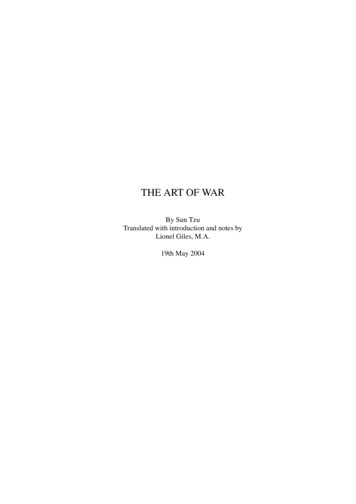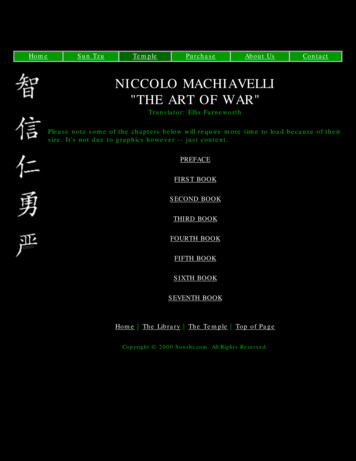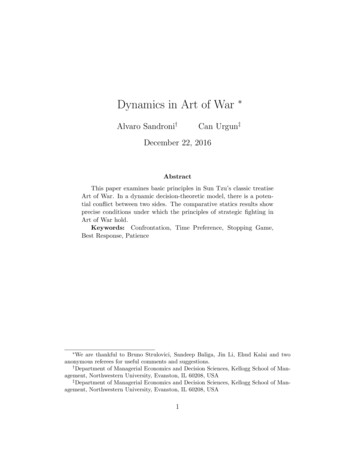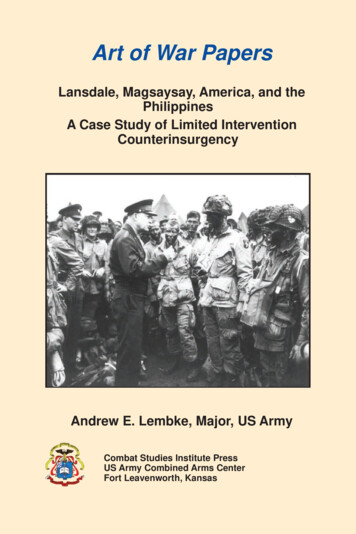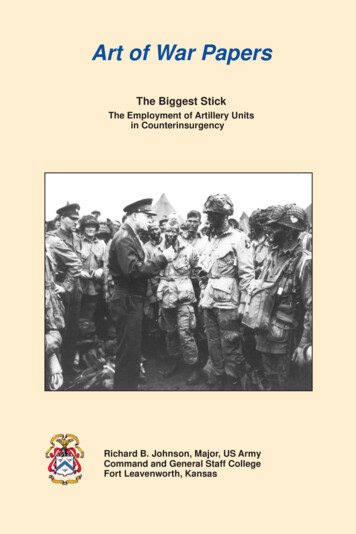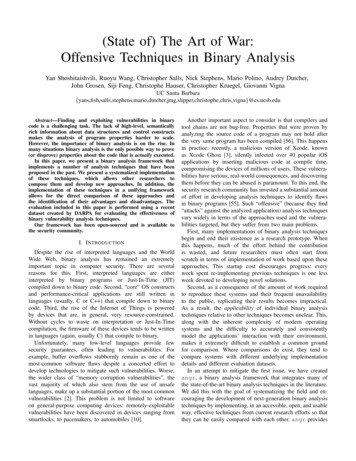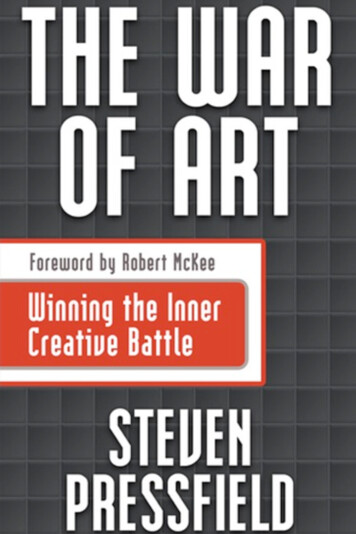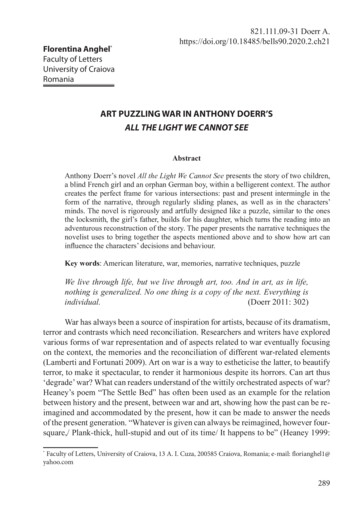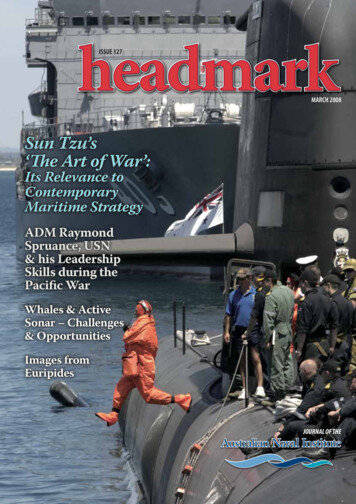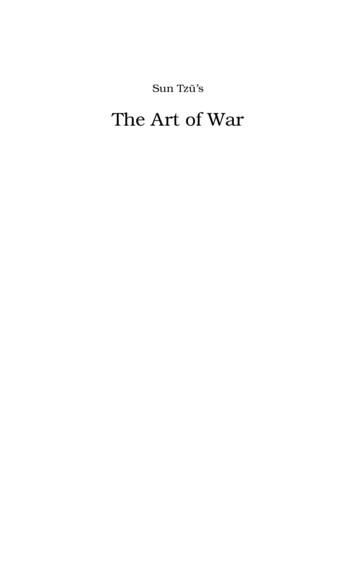
Transcription
Sun Tzŭ’sThe Art of War
Sun Tzŭ’sThe Art of Wartranslated by Lionel Giles, M.A.Pax LibrorumPublishing House2009
The Art of War by Sun Tzŭ, as translated by Lionel Giles, M.A.First published in 1910.This edition has been corrected of transcription errors and typeset for modern printingequipment to maximize quality and readability. It is simultaneously published as apaperback book, and can be purchased from the Amazon.com or BN.com websites for 3.99 USD. If you enjoyed this free eBook, please consider supporting the publisherby purchasing a copy.II./1. 2009.All rights reserved. No part of this eBook may be used or reproduced in any mannerwhatsoever without written permission of the Publisher. Non-profit digital distributionhowever is explicitly permitted and encouraged by the Publisher. Please note that thetext presented herein is in the public domain and the publisher makes no copyrightclaims thereto.Editor: Aggott Hönsch IstvánThe paperback edition of this eBook is identified by ISBN 978-0-9811626-3-8Published by Pax Librorum Publishing Housewww.PaxLibrorum.com
To my brotherCaptain Valentine Giles, R.G.in the hope thata work 2400 years oldmay yet contain lessons worth considerationby the soldier of to-daythis translationis affectionately dedicated
ContentsIntroduction . . . . . . . . . . . . . . . . . . . . . . . . . . . . . . . . . . . . . . . . . . . . . . . . . .1I. Laying Plans . . . . . . . . . . . . . . . . . . . . . . . . . . . . . . . . . . . . . . . . . . . . . . . . . .3II. Waging War . . . . . . . . . . . . . . . . . . . . . . . . . . . . . . . . . . . . . . . . . . . . . . . . . . .7III. Attack by Stratagem . . . . . . . . . . . . . . . . . . . . . . . . . . . . . . . . . . . . . . . . 11IV. Tactical Dispositions . . . . . . . . . . . . . . . . . . . . . . . . . . . . . . . . . . . . . . . . . 15V. Energy . . . . . . . . . . . . . . . . . . . . . . . . . . . . . . . . . . . . . . . . . . . . . . . . . . . . . . . . 17VI. Weak Points and Strong . . . . . . . . . . . . . . . . . . . . . . . . . . . . . . . . . . . . . 21VII. Manœuvring . . . . . . . . . . . . . . . . . . . . . . . . . . . . . . . . . . . . . . . . . . . . . . . . . . 25VIII. Variation in Tactics . . . . . . . . . . . . . . . . . . . . . . . . . . . . . . . . . . . . . . . . . . 29IX. The Army on the March . . . . . . . . . . . . . . . . . . . . . . . . . . . . . . . . . . . . . . 31X. Terrain . . . . . . . . . . . . . . . . . . . . . . . . . . . . . . . . . . . . . . . . . . . . . . . . . . . . . . . . 37XI. The Nine Situations . . . . . . . . . . . . . . . . . . . . . . . . . . . . . . . . . . . . . . . . . . . 41XII. The Attack by Fire . . . . . . . . . . . . . . . . . . . . . . . . . . . . . . . . . . . . . . . . . . . 49XIII. The Use of Spies . . . . . . . . . . . . . . . . . . . . . . . . . . . . . . . . . . . . . . . . . . . . . . 53vii
IntroductionSun Tzŭ Wu was a native of the Ch‘i State. His Art of War broughthim to the notice of Ho Lu, King of Wu. Ho Lu said to him: “I havecarefully perused your 13 chapters. May I submit your theory ofmanaging soldiers to a slight test?”Sun Tzŭ replied: “You may.”Ho Lu asked: “May the test be applied to women?”The answer was again in the affirmative, so arrangements weremade to bring 180 ladies out of the Palace. Sun Tzŭ divided them intotwo companies, and placed one of the King’s favourite concubines atthe head of each. He then bade them all take spears in their hands,and addressed them thus: “I presume you know the differencebetween front and back, right hand and left hand?”The girls replied: “Yes.”Sun Tzŭ went on: “When I say ‘Eyes front,’ you must look straightahead. When I say ‘Left turn,’ you must face towards your left hand.When I say ‘Right turn,’ you must face towards your right hand.When I say ‘About turn,’ you must face right round towards yourback.”Again the girls assented. The words of command having beenthus explained, he set up the halberds and battle-axes in order tobegin the drill. Then, to the sound of drums, he gave the order “Rightturn.” But the girls only burst out laughing. Sun Tzŭ said: “If wordsof command are not clear and distinct, if orders are not thoroughlyunderstood, then the general is to blame.”So he started drilling them again, and this time gave the order“Left turn,” whereupon the girls once more burst into fits of laughter.Sun Tzŭ: “If words of command are not clear and distinct, if ordersare not thoroughly understood, the general is to blame. But if hisorders are clear, and the soldiers nevertheless disobey, then it is the1
The Art of War, Sun Tzŭfault of their officers.”So saying, he ordered the leaders of the two companies to bebeheaded. Now the King of Wu was watching the scene from the topof a raised pavilion; and when he saw that his favourite concubineswere about to be executed, he was greatly alarmed and hurriedlysent down the following message: “We are now quite satisfied as toour general’s ability to handle troops. If We are bereft of these twoconcubines, our meat and drink will lose their savour. It is our wishthat they shall not be beheaded.”Sun Tzŭ replied: “Having once received His Majesty’s commissionto be the general of his forces, there are certain commands of HisMajesty which, acting in that capacity, I am unable to accept.”Accordingly, he had the two leaders beheaded, and straightwayinstalled the pair next in order as leaders in their place. When thishad been done, the drum was sounded for the drill once more; andthe girls went through all the evolutions, turning to the right or tothe left, marching ahead or wheeling back, kneeling or standing,with perfect accuracy and precision, not venturing to utter a sound.Then Sun Tzŭ sent a messenger to the King saying: “Your soldiers,Sire, are now properly drilled and disciplined, and ready for yourmajesty’s inspection. They can be put to any use that their sovereignmay desire; bid them go through fire and water, and they will notdisobey.”But the King replied: “Let our general cease drilling and returnto camp. As for us, We have no wish to come down and inspect thetroops.”Thereupon Sun Tzŭ said: “The King is only fond of words, andcannot translate them into deeds.”After that, Ho Lu saw that Sun Tzŭ was one who knew how tohandle an army, and finally appointed him general. In the west, hedefeated the Ch‘u State and forced his way into Ying, the capital; tothe north he put fear into the States of Ch‘i and Chin, and spread hisfame abroad amongst the feudal princes. And Sun Tzŭ shared in themight of the King.— Ssŭ-ma Ch‘ien (c. 145 BC – 86 BC)2
ILaying Plans1. Sun Tzŭ said: The art of war is of vital importance to the State.2. It is a matter of life and death, a road either to safety or to ruin.Hence it is a subject of inquiry which can on no account beneglected.3. The art of war, then, is governed by five constant factors, tobe taken into account in one’s deliberations, when seeking todetermine the conditions obtaining in the field.4. These are: (1) the Moral Law; (2) Heaven; (3) Earth; (4) theCommander; (5) method and discipline.5, 6. The Moral Law causes the people to be in complete accord withtheir ruler, so that they will follow him regardless of their lives,undismayed by any danger.7. Heaven signifies night and day, cold and heat, times andseasons.8. Earth comprises distances, great and small; danger and security; open ground and narrow passes; the chances of life anddeath.9. The Commander stands for the virtues of wisdom, sincerity,benevolence, courage and strictness.3
The Art of War, Sun Tzŭ10. By method and discipline are to be understood the marshalingof the army in its proper subdivisions, the graduations of rankamong the officers, the maintenance of roads by which suppliesmay reach the army, and the control of military expenditure.11. These five heads should be familiar to every general: he whoknows them will be victorious; he who knows them not will fail.12. Therefore, in your deliberations, when seeking to determine themilitary conditions, let them be made the basis of a comparison,in this wise: —13. (1) Which of the two sovereigns is imbued with the Moral Law?(2) Which of the two generals has most ability?(3) With whom lie the advantages derived from Heaven andEarth?(4) On which side is discipline most rigorously enforced?(5) Which army is stronger?(6) On which side are officers and men more highly trained?(7) In which army is there the greater constancy both in rewardand punishment?14. By means of these seven considerations I can forecast victoryor defeat.15. The general that hearkens to my counsel and acts upon it, willconquer: — let such a one be retained in command! The generalthat hearkens not to my counsel nor acts upon it, will sufferdefeat: — let such a one be dismissed!16. While heeding the profit of my counsel, avail yourself also ofany helpful circumstances over and beyond the ordinary rules.17. According as circumstances are favourable, one should modifyone’s plans.18. All warfare is based on deception.19. Hence, when able to attack, we must seem unable; when usingour forces, we must seem inactive; when we are near, we mustmake the enemy believe we are far away; when far away, wemust make him believe we are near.4
I. Laying Plans20. Hold out baits to entice the enemy. Feign disorder, and crushhim.21. If he is secure at all points, be prepared for him. If he is insuperior strength, evade him.22. If your opponent is of choleric temper, seek to irritate him.Pretend to be weak, that he may grow arrogant.23. If he is taking his ease, give him no rest. If his forces are united,separate them.24. Attack him where he is unprepared, appear where you are notexpected.25. These military devices, leading to victory, must not be divulgedbeforehand.26. Now the general who wins a battle makes many calculationsin his temple ere the battle is fought. The general who loses abattle makes but few calculations beforehand. Thus do manycalculations lead to victory, and few calculations to defeat: howmuch more no calculation at all! It is by attention to this pointthat I can foresee who is likely to win or lose.5
IIWaging War1. Sun Tzŭ said: In the operations of war, where there are in thefield a thousand swift chariots, as many heavy chariots, and ahundred thousand mail-clad soldiers, with provisions enoughto carry them a thousand Li, the expenditure at home and atthe front, including entertainment of guests, small items suchas glue and paint, and sums spent on chariots and armour,will reach the total of a thousand ounces of silver per day. Suchis the cost of raising an army of 100,000 men.2. When you engage in actual fighting, if victory is long in coming,then men’s weapons will grow dull and their ardour will bedamped. If you lay siege to a town, you will exhaust yourstrength.3. Again, if the campaign is protracted, the resources of the Statewill not be equal to the strain.4. Now, when your weapons are dulled, your ardour damped, yourstrength exhausted and your treasure spent, other chieftainswill spring up to take advantage of your extremity. Then noman, however wise, will be able to avert the consequences thatmust ensue.5. Thus, though we have heard of stupid haste in war, clevernesshas never been seen associated with long delays.6. There is no instance of a country having benefited from prolonged warfare.7
The Art of War, Sun Tzŭ7. It is only one who is thoroughly acquainted with the evils of warthat can thoroughly understand the profitable way of carryingit on.8. The skillful soldier does not raise a second levy, neither are hissupply-waggons loaded more than twice.9. Bring war material with you from home, but forage on theenemy. Thus the army will have food enough for its needs.10. Poverty of the State exchequer causes an army to be maintainedby contributions from a distance. Contributing to maintain anarmy at a distance causes the people to be impoverished.11. On the other hand, the proximity of an army causes pricesto go up; and high prices cause the people’s substance to bedrained away.12. When their substance is drained away, the peasantry will beafflicted by heavy exactions.13, 14. With this loss of substance and exhaustion of strength, thehomes of the people will be stripped bare, and three-tenths oftheir income will be dissipated; while Government expensesfor broken chariots, worn-out horses, breast-plates and helmets, bows and arrows, spears and shields, protective mantles,draught-oxen and heavy waggons, will amount to four-tenthsof its total revenue.15. Hence a wise general makes a point of foraging on the enemy.One cartload of the enemy’s provisions is equivalent to twentyof one’s own, and likewise a single picul of his provender isequivalent to twenty from one’s own store.16. Now in order to kill the enemy, our men must be roused toanger; that there may be advantage from defeating the enemy,they must have their rewards.17. Therefore in chariot fighting, when ten or more chariots havebeen taken, those should be rewarded who took the first. Ourown flags should be substituted for those of the enemy, andthe chariots mingled and used in conjunction with ours. Thecaptured soldiers should be kindly treated and kept.8
II. Waging War18. This is called, using the conquered foe to augment one’s ownstrength.19. In war, then, let your great object be victory, not lengthycampaigns.20. Thus it may be known that the leader of armies is the arbiterof the people’s fate, the man on whom it depends whether thenation shall be in peace or in peril.9
IIIAttack by Stratagem1. Sun Tzŭ said: In the practical art of war, the best thing of all isto take the enemy’s country whole and intact; to shatter anddestroy it is not so good. So, too, it is better to capture an armyentire than to destroy it, to capture a regiment, a detachmentor a company entire than to destroy them.2. Hence to fight and conquer in all your battles is not supremeexcellence; supreme excellence consists in breaking the enemy’sresistance without fighting.3. Thus the highest form of generalship is to baulk the enemy’splans; the next best is to prevent the junction of the enemy’sforces; the next in order is to attack the enemy’s army in thefield; and the worst policy of all is to besiege walled cities.4. The rule is, not to besiege walled cities if it can possibly beavoided. The preparation of mantlets, movable shelters, andvarious implements of war, will take up three whole months;and the piling up of mounds over against the walls will takethree months more.5. The general, unable to control his irritation, will launch hismen to the assault like swarming ants, with the result thatone-third of his men are slain, while the town still remainsuntaken. Such are the disastrous effects of a siege.6. Therefore the skillful leader subdues the enemy’s troops withoutany fighting; he captures their cities without laying siege to11
The Art of War, Sun Tzŭthem; he overthrows their kingdom without lengthy operationsin the field.7. With his forces intact he will dispute the mastery of the Empire,and thus, without losing a man, his triumph will be complete.This is the method of attacking by stratagem.8. It is the rule in war, if our forces are ten to the enemy’s one, tosurround him; if five to one, to attack him; if twice as numerous,to divide our army into two.9. If equally matched, we can offer battle; if slightly inferior innumbers, we can avoid the enemy; if quite unequal in everyway, we can flee from him.10. Hence, though an obstinate fight may be made by a small force,in the end it must be captured by the larger force.11. Now the general is the bulwark of the State; if the bulwark iscomplete at all points, the State will be strong; if the bulwarkis defective, the State will be weak.12. There are three ways in which a ruler can bring misfortuneupon his army: —13. (1) By commanding the army to advance or to retreat, beingignorant of the fact that it cannot obey. This is called hobblingthe army.14. (2) By attempting to govern an army in the same way as headministers a kingdom, being ignorant of the conditions whichobtain in an army. This causes restlessness in the soldier’sminds.15. (3) By employing the officers of his army without discrimination,through ignorance of the military principle of adaptation tocircumstances. This shakes the confidence of the soldiers.16. But when the army is restless and distrustful, trouble is sureto come from the other feudal princes. This is simply bringinganarchy into the army, and flinging victory away.17. Thus we may know that there are five essentials for victory:12
III. Attack by Stratagem(1) He will win who knows when to fight and when not to fight.(2) He will win who knows how to handle both superior andinferior forces.(3) He will win whose army is animated by the same spiritthroughout all its ranks.(4) He will win who, prepared himself, waits to take the enemyunprepared.(5) He will win who has military capacity and is not interferedwith by the sovereign.Victory lies in the knowledge of these five points.18. Hence the saying: If you know the enemy and know yourself,you need not fear the result of a hundred battles. If you knowyourself but not the enemy, for every victory gained you willalso suffer a defeat. If you know neither the enemy nor yourself,you will succumb in every battle.13
IVTactical Dispositions1. Sun Tzŭ said: The good fighters of old first put themselvesbeyond the possibility of defeat, and then waited for an opportunity of defeating the enemy.2. To secure ourselves against defeat lies in our own hands, butthe opportunity of defeating the enemy is provided by the enemyhimself.3. Thus the good fighter is able to secure himself against defeat,but cannot make certain of defeating the enemy.4. Hence the saying: One may know how to conquer withoutbeing able to do it.5. Security against defeat implies defensive tactics; ability todefeat the enemy means taking the offensive.6. Standing on the defensive indicates insufficient strength; attacking, a superabundance of strength.7. The general who is skilled in defence hides in the most secretrecesses of the earth; he who is skilled in attack flashes forthfrom the topmost heights of heaven. Thus on the one hand wehave ability to protect ourselves; on the other, a victory that iscomplete.8. To see victory only when it is within the ken of the commonherd is not the acme of excellence.15
The Art of War, Sun Tzŭ9. Neither is it the acme of excellence if you fight and conquerand the whole Empire says, “Well done!”10. To lift an autumn hair is no sign of great strength; to see thesun and moon is no sign of sharp sight; to hear the noise ofthunder is no sign of a quick ear.11. What the ancients called a clever fighter is one who not onlywins, but excels in winning with ease.12. Hence his victories bring him neither reputation for wisdomnor credit for courage.13. He wins his battles by making no mistakes. Making no mistakes is what establishes the certainty of victory, for it meansconquering an enemy that is already defeated.14. Hence the skillful fighter puts himself into a position whichmakes defeat impossible, and does not miss the moment fordefeating the enemy.15. Thus it is that in war the victorious strategist only seeks battleafter the victory has been won, whereas he who is destined todefeat first fights and afterwards looks for victory.16. The consummate leader cultivates the Moral Law, and strictlyadheres to method and discipline; thus it is in his power tocontrol success.17. In respect of military method, we have, firstly, Measurement;secondly, Estimation of quantity; thirdly, Calculation; fourthly,Balancing of chances; fifthly, Victory.18. Measurement owes its existence to Earth; Estimation of quantity to Measurement; Calculation to Estimation of quantity;Balancing of chances to Calculation; and Victory to Balancingof chances.19. A victorious army opposed to a routed one, is as a pound’sweight placed in the scale against a single grain.20. The onrush of a conquering force is like the bursting of pent-upwaters into a chasm a thousand fathoms deep. So much fortactical dispositions.16
VEnergy1. Sun Tzŭ said: The control of a large force is the same in principleas the control of a few men: it is merely a question of dividingup their numbers.2. Fighting with a large army under your command is nowisedifferent from fighting with a small one: it is merely a questionof instituting signs and signals.3. To ensure that your whole host may withstand the brunt ofthe enemy’s attack and remain unshaken — this is effected bymanœuvres direct and indirect.4. That the impact of your army may be like a grindstone dashedagainst an egg — this is effected by the science of weak pointsand strong.5. In all fighting, the direct method may be used for joining battle,but indirect methods will be needed in order to secure victory.6. Indirect tactics, efficiently applied, are inexhaustible as Heavenand Earth, unending as the flow of rivers and streams; likethe sun and moon, they end but to begin anew; like the fourseasons, they pass away to return once more.7. There are not more than five musical notes, yet the combinations of these five give rise to more melodies than can ever beheard.17
The Art of War, Sun Tzŭ8. There are not more than five primary colours, yet in combination they produce more hues than can ever been seen.9. There are not more than five cardinal tastes, yet combinationsof them yield more flavours than can ever be tasted.10. In battle, there are not more than two methods of attack — thedirect and the indirect; yet these two in combination give riseto an endless series of manœuvres.11. The direct and the indirect lead on to each other in turn. It islike moving in a circle — you never come to an end. Who canexhaust the possibilities of their combination?12. The onset of troops is like the rush of a torrent which will evenroll stones along in its course.13. The quality of decision is like the well-timed swoop of a falconwhich enables it to strike and destroy its victim.14. Therefore the good fighter will be terrible in his onset, andprompt in his decision.15. Energy may be likened to the bending of a crossbow; decision,to the releasing of a trigger.16. Amid the turmoil and tumult of battle, there may be seemingdisorder and yet no real disorder at all; amid confusion andchaos, your array may be without head or tail, yet it will beproof against defeat.17. Simulated disorder postulates perfect discipline; simulated fearpostulates courage; simulated weakness postulates strength.18. Hiding order beneath the cloak of disorder is simply a questionof subdivision; concealing courage under a show of timiditypresupposes a fund of latent energy; masking strength withweakness is to be effected by tactical dispositions.19. Thus one who is skillful at keeping the enemy on the movemaintains deceitful appearances, according to which the enemywill act. He sacrifices something, that the enemy may snatchat it.18
V. Energy20. By holding out baits, he keeps him on the march; then with abody of picked men he lies in wait for him.21. The clever combatant looks to the effect of combined energy,and does not require too much from individuals. Hence hisability to pick out the right men and to utilise combined energy.22. When he utilises combined energy, his fighting men become asit were like unto rolling logs or stones. For it is the nature of alog or stone to remain motionless on level ground, and to movewhen on a slope; if four-cornered, to come to a standstill, but ifround-shaped, to go rolling down.23. Thus the energy developed by good fighting men is as themomentum of a round stone rolled down a mountain thousandsof feet in height. So much on the subject of energy.19
VIWeak Points and Strong1. Sun Tzŭ said: Whoever is first in the field and awaits the comingof the enemy, will be fresh for the fight; whoever is second inthe field and has to hasten to battle will arrive exhausted.2. Therefore the clever combatant imposes his will on the enemy,but does not allow the enemy’s will to be imposed on him.3. By holding out advantages to him, he can cause the enemy toapproach of his own accord; or, by inflicting damage, he canmake it impossible for the enemy to draw near.4. If the enemy is taking his ease, he can harass him; if wellsupplied with food, he can starve him out; if quietly encamped,he can force him to move.5. Appear at points which the enemy must hasten to defend;march swiftly to places where you are not expected.6. An army may march great distances without distress, if itmarches through country where the enemy is not.7. You can be sure of succeeding in your attacks if you only attackplaces which are undefended.You can ensure the safety of yourdefence if you only hold positions that cannot be attacked.8. Hence that general is skillful in attack whose opponent doesnot know what to defend; and he is skillful in defence whoseopponent does not know what to attack.21
The Art of War, Sun Tzŭ9. O divine art of subtlety and secrecy! Through you we learn tobe invisible, through you inaudible; and hence we can hold theenemy’s fate in our hands.10. You may advance and be absolutely irresistible, if you makefor the enemy’s weak points; you may retire and be safe frompursuit if your movements are more rapid than those of theenemy.11. If we wish to fight, the enemy can be forced to an engagementeven though he be sheltered behind a high rampart and a deepditch. All we need do is to attack some other place that he willbe obliged to relieve.12. If we do not wish to fight, we can prevent the enemy fromengaging us even though the lines of our encampment bemerely traced out on the ground. All we need do is to throwsomething odd and unaccountable in his way.13. By discovering the enemy’s dispositions and remaining invisibleourselves, we can keep our forces concentrated, while theenemy’s must be divided.14. We can form a single united body, while the enemy must splitup into fractions. Hence there will be a whole pitted againstseparate parts of a whole, which means that we shall be manyto the enemy’s few.15. And if we are able thus to attack an inferior force with a superiorone, our opponents will be in dire straits.16. The spot where we intend to fight must not be made known; forthen the enemy will have to prepare against a possible attackat several different points; and his forces being thus distributedin many directions, the numbers we shall have to face at anygiven point will be proportionately few.17. For should the enemy strengthen his van, he will weaken hisrear; should he strengthen his rear, he will weaken his van;should he strengthen his left, he will weaken his right; shouldhe strengthen his right, he will weaken his left. If he sendsreinforcements everywhere, he will everywhere be weak.22
VI. Weak Points and Strong18. Numerical weakness comes from having to prepare againstpossible attacks; numerical strength, from compelling ouradversary to make these preparations against us.19. Knowing the place and the time of the coming battle, we mayconcentrate from the greatest distances in order to fight.20. But if neither time nor place be known, then the left wing willbe impotent to succour the right, the right equally impotent tosuccour the left, the van unable to relieve the rear, or the rearto support the van. How much more so if the furthest portionsof the army are anything under a hundred Li apart, and eventhe nearest are separated by several Li!21. Though according to my estimate the soldiers of Yüeh exceedour own in number, that shall advantage them nothing in thematter of victory. I say then that victory can be achieved.22. Though the enemy be stronger in numbers, we may preventhim from fighting. Scheme so as to discover his plans and thelikelihood of their success.23. Rouse him, and learn the principle of his activity or inactivity.Force him to reveal himself, so as to find out his vulnerablespots.24. Carefully compare the opposing army with your own, so thatyou may know where strength is superabundant and where itis deficient.25. In making tactical dispositions, the highest pitch you canattain is to conceal them; conceal your dispositions, and youwill be safe from the prying of the subtlest spies, from themachinations of the wisest brains.26. How victory may be produced for them out of the enemy’s owntactics — that is what the multitude cannot comprehend.27. All men can see the tactics whereby I conquer, but what nonecan see is the strategy out of which victory is evolved.28. Do not repeat the tactics which have gained you one victory,but let your methods be regulated by the infinite variety ofcircumstances.23
The Art of War, Sun Tzŭ29. Military tactics are like unto water; for water in its naturalcourse runs away from high places and hastens downwards.30. So in war, the way is to avoid what is strong and to strike atwhat is weak.31. Water shapes its course according to the nature of the groundover which it flows; the soldier works out his victory in relationto the foe whom he is facing.32. Therefore, just as water retains no constant shape, so in warfarethere are no constant conditions.33. He who can modify his tactics in relation to his opponentand thereby succeed in winning, may be called a heaven-borncaptain.34. The five elements are not always equally predominant; the fourseasons make way for each other in turn. There are short daysand long; the moon has its periods of waning and waxing.24
VIIManœuvring1. Sun Tzŭ said: In war, the general receives his commands fromthe sovereign.2. Having collected an army and concentrated his forces, he mustblend and harmonise the different elements thereof beforepitching his camp.3. After that, comes tactical manœuvring, than which there isnothing more difficult. The difficulty of tactical manœuvringconsists in turning the d
1. Sun Tzu said: The art of war is of vital importance to the State. 2. It is a matter of life and death, a road either to safety or to ruin. Hence it is a subject of inquiry which can on no account be neglected. 3. The art of war, then, is governed by five constant factors, to be t

